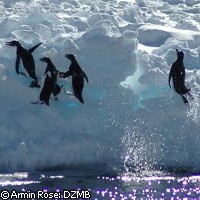New portal puts spotlight on Antarctic biodiversity
Scientists seeking data on Antarctic biodiversity are set to benefit from the launch of the beta version of a free, online portal containing the latest information on life in and around the Antarctic region. Dubbed SCAR-MarBIN (Scientific Committee on Antarctic Research - Marine Biodiversity Information Network), the portal is the brainchild of Claude De Broyer and Bruno Danis of the Royal Belgian Institute of Natural Sciences. It forms a major Belgian contribution to the International Polar Year (IPY), which ran from March 2007 to March 2009. Since its inception, the portal has become an increasingly international affair, with scientists from around the world working to turn the portal into the research and conservation tool it is today. 'SCAR-MarBIN is a unique tool that allows over a hundred international datasets to be searched and shown on one map,' commented Huw Griffiths of the British Antarctic Survey. 'This is the first time such a huge amount of Antarctic biodiversity information has been brought together and [it] is leading to a much better understanding of how and where life in this frozen ocean exists.' At the heart of SCAR-MarBIN is the first ever complete Register of Antarctic Marine Species (RAMS), which contains information on the occurrence and abundance of almost all known Antarctic-dwelling species. The register includes data from 18 research expeditions that visited the region during the IPY, as well as data from earlier trips to the Antarctic. As such, it provides an important baseline for future efforts to determine the impacts of climate change on Antarctic biodiversity. Furthermore, the data is quality controlled by a team of experts and standardised to ease information flows between the RAMS and other online marine biodiversity databases. In addition to the RAMS, the portal offers downloadable field guides, identification keys, information on expeditions, access to pictures, videos and other multimedia forms, and a directory of Antarctic experts. 'The best international science relies on effective communication. Given the remoteness of Antarctica and the many nations contributing to its study, a mechanism for ensuring fast and effective information flow is essential. SCAR-MarBIN provides that mechanism in an exemplary way,' stated Professor Andrew Clarke of the British Antarctic Survey. 'Since its inception, SCAR-MarBIN has rapidly established itself as an invaluable tool for allowing a global community not only to gain access to data, but also to analyse and visualise it in innovative and powerful ways. Without doubt, SCAR-MarBIN is now the most important tool for marine ecologists and oceanographers working in the southern polar regions, and its newest version will, without question, increase its value to the scientific community.'
Countries
Antarctica, Belgium



